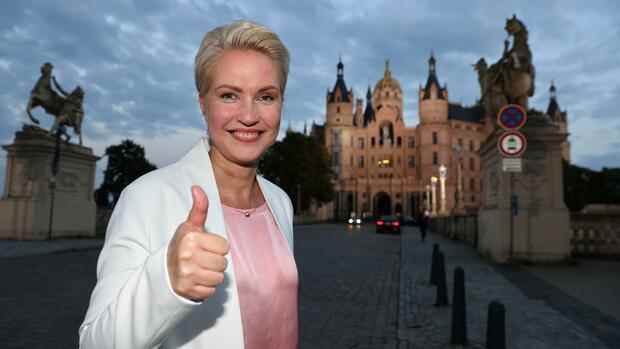Remains Prime Minister of Mecklenburg-Western Pomerania: Manuela Schwesig (SPD).
(Photo: dpa)
Berlin Manuela Schwesig (SPD) was already celebrating before the polling stations for the state elections in Mecklenburg-Western Pomerania closed. “We gave everything to the end,” said the Prime Minister in a good mood on Sunday.
According to the first extrapolation by ZDF, the Social Democrats received 38.2 percent of the votes in the state elections and 38.3 percent of the votes in the ARD, thus achieving a result for an East German regional association that was last there about 20 years ago. At a time when personalities like Manfred Stolpe or Harald Ringstorff gave the SPD voice, face and weight in the east.
Like only these two veterans of the SPD, who have since died, the 47-year-old Schwesig has now managed to bring the party, which is usually ailing in the east, to around 40 percent.
And so the jubilation in the evening at the SPD election party in Schwerin knew no bounds. “This is a wonderful evening for our country, for the SPD in Mecklenburg-Western Pomerania,” said a visibly satisfied Schwesig to the cheers of around 120 party members. The citizen’s vote is clear and a mandate to them and the SPD to continue to run the country that they gladly accept.
Top jobs of the day
Find the best jobs now and
be notified by email.
In turn, the CDU – Schwesig’s coalition partner so far – incurred heavy losses and came in at 14.3 percent. CDU country chief Michael Sack had to admit on election evening that the result of his party was “catastrophic”. The second strongest force was the AfD with 18.0 percent. The FDP and the Greens can hope to move into parliament.
Bettina Jarasch (Greens) in Berlin in front of Franziska Giffey (SPD)
In Berlin there is again an open race between the Social Democrats and the Greens. According to initial forecasts, the SPD top candidate Franziska Giffey comes to 21.5 percent. The Greens’ challenger, Bettina Jarasch, is ahead with 23.5 percent.
According to the forecasts, the CDU will be the third strongest force with 15 percent. In the capital there were long queues in front of some polling stations, which had to be temporarily closed due to mixed up ballot papers.
It comes as a surprise that the Greens are ahead in the forecasts. Giffey had caught up in the race for the Red Town Hall. Under Mayor Michael Müller, the SPD had meanwhile fallen behind the Greens, Leftists and the CDU in surveys.
But while the Greens had sent a rather inconspicuous candidate into the race with their candidate Jarasch, Giffey benefited from her fame as a former Federal Family Minister and Mayor of Neukölln. The election campaign was tailor-made for her. The plagiarism affair surrounding her doctoral thesis was apparently not a burden.
Bettina Jarasch (l), top candidate of the Berlin Greens, and Franziska Giffey, top candidate of the Berlin SPD.
(Photo: dpa)
Giffey also scored points by clearly distinguishing herself from the previous red-red-green Senate. The 43-year-old emphasized how important the economy was to her, describing expropriations as the “red line”. She wants to push ahead with the expansion of city highways and refrain from experiments such as the rent cap. A renewed left-wing coalition always left it open, instead, a traffic light coalition is also being discussed in the city-state.
Manuela Schwesig is even more untouchable after her election victory. The 47-year-old has finally arrived in the role of the mother of the country. The mother of two promises a strong economy, social cohesion, extols the abolition of all childcare fees. Above all, Schwesig scored points with her role in the corona policy. As early as 2019, Schwesig and Giffey were considered the logical candidates for the party leadership of the Federal SPD.
More: Follow the current developments on the day of the Bundestag election in our news blog
